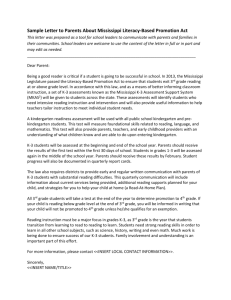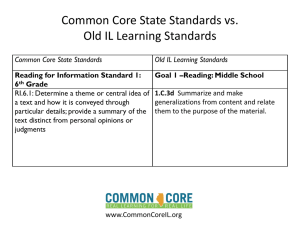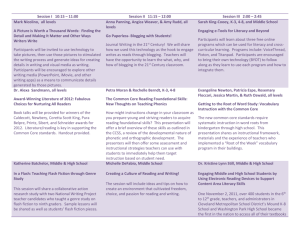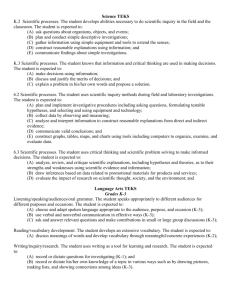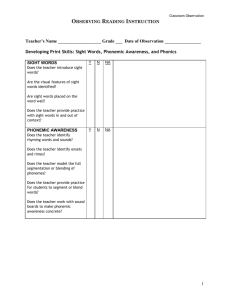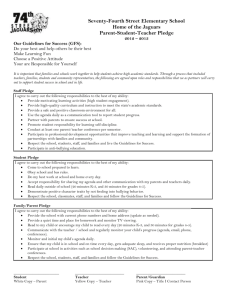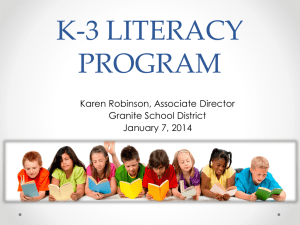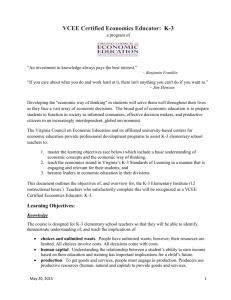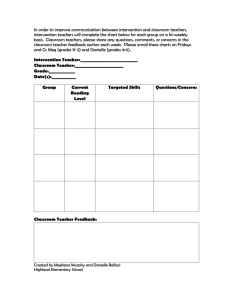K-3 Literacy Plan - 2014-2015
advertisement
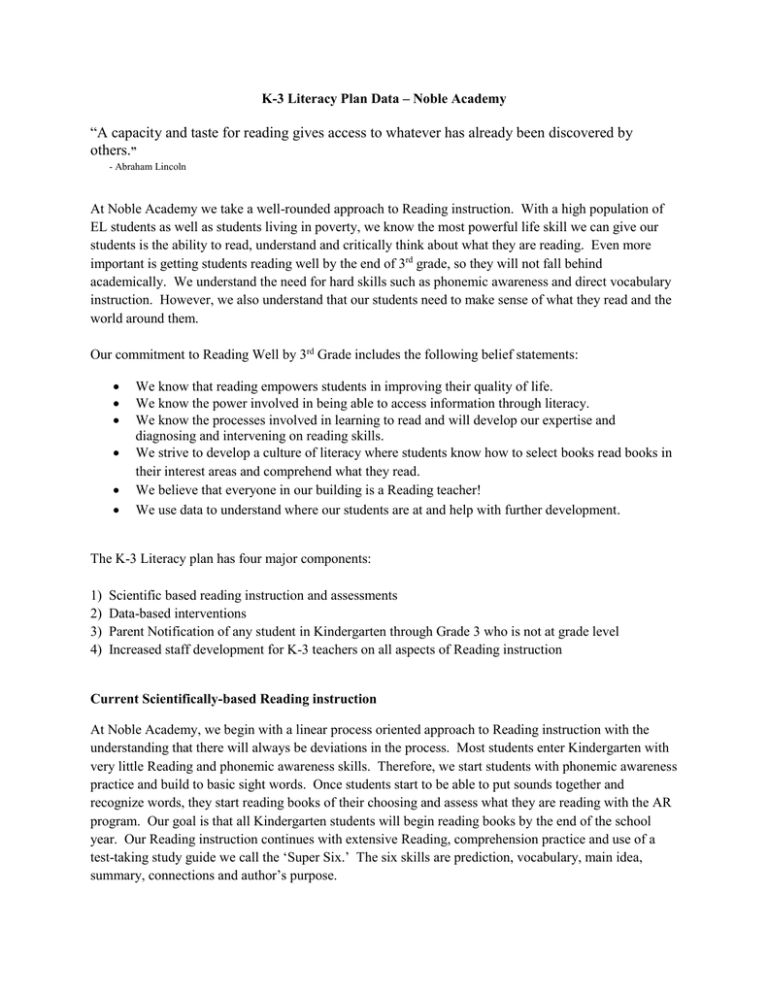
K-3 Literacy Plan Data – Noble Academy “A capacity and taste for reading gives access to whatever has already been discovered by others.” - Abraham Lincoln At Noble Academy we take a well-rounded approach to Reading instruction. With a high population of EL students as well as students living in poverty, we know the most powerful life skill we can give our students is the ability to read, understand and critically think about what they are reading. Even more important is getting students reading well by the end of 3rd grade, so they will not fall behind academically. We understand the need for hard skills such as phonemic awareness and direct vocabulary instruction. However, we also understand that our students need to make sense of what they read and the world around them. Our commitment to Reading Well by 3rd Grade includes the following belief statements: We know that reading empowers students in improving their quality of life. We know the power involved in being able to access information through literacy. We know the processes involved in learning to read and will develop our expertise and diagnosing and intervening on reading skills. We strive to develop a culture of literacy where students know how to select books read books in their interest areas and comprehend what they read. We believe that everyone in our building is a Reading teacher! We use data to understand where our students are at and help with further development. The K-3 Literacy plan has four major components: 1) 2) 3) 4) Scientific based reading instruction and assessments Data-based interventions Parent Notification of any student in Kindergarten through Grade 3 who is not at grade level Increased staff development for K-3 teachers on all aspects of Reading instruction Current Scientifically-based Reading instruction At Noble Academy, we begin with a linear process oriented approach to Reading instruction with the understanding that there will always be deviations in the process. Most students enter Kindergarten with very little Reading and phonemic awareness skills. Therefore, we start students with phonemic awareness practice and build to basic sight words. Once students start to be able to put sounds together and recognize words, they start reading books of their choosing and assess what they are reading with the AR program. Our goal is that all Kindergarten students will begin reading books by the end of the school year. Our Reading instruction continues with extensive Reading, comprehension practice and use of a test-taking study guide we call the ‘Super Six.’ The six skills are prediction, vocabulary, main idea, summary, connections and author’s purpose. What are we currently using for scientifically-based Reading instruction? Resource, Strategy or Program Houghton-Mifflin Reading Reading Eggs Study Island AR – Actual Books Grade Levels Used K-3 K-1 K-3 K-3 Skills it teaches and assesses Comprehensive reading program Phonics, Sight words Comprehensive Comprehension, Vocabulary Writer’s Workshop Author Study Starfall A-Z Leveled Readings K-2 1-2 K-2 K-2 Editing, grammar, Six Traits Super Six Phonics, sight words, reading Sight words, fluency Reading Assessment We are very intentional about assessing our students reading abilities and use these assessments as formative data to inform our instruction. Understanding that students progress through different stages of reading development form K-3, we use a range of assessments. We believe that by using a wide variety of assessments we will be able to intervene in a timely and effective manner to ensure that all students are progressing in their reading ability. What reading assessments are we currently using? Assessment Name Star Reading Grade Levels 1-3 Study Island Pre-test K-3 Comprehensive NWEA K-3 Depends on grade level, reading comprehension and language skills. Comprehension Thematic Units with Common Assessments Spelling Test Reading Eggs 2 K-3 Comprehension Super Six, Comprehensive Reading Strategies Spelling Phonics, Sight Words 2 &3 K-2 What it assesses? Grammar, Vocabulary and Comprehension Teacher comments Good starting point for what level of books students should be reading Do this for grades 3 and up, not K-2 (make it optional). The program is very wordy for students and we find students are memorizing questions and passing because they have memorized the answers. Good way to track students; not the most reliable (especially when used so many times-there is a lot of test exhaustion) Students’ spelling improves Great, fun program for students to use to learn phonics and sight words Use of Data Our goal at Noble is to use data to insure effective and appropriate instruction while maintaining a system of accountability for students and teachers. We never hesitate to share grade level, non-confidential grade level and school-wide data to insure we are all progressing towards our goals. We use a wide range of data to triangulate results and guard against abnormalities or misreads of data. Data that we will be completing before June 1 Assessment 3rd Grade MCA-III NWEA Star Reading Tests - % is students on grade level on June 3rd Study Island - % is students on grade level on May 15 Reading Eggs - % is students complete on June 3rd Stanford- % is students on grade level K-2 ( Total Reading) Percent of Students at Grade Level 2014/15- 47.72% (preliminary) 2013/14-35.7% 2012/13-57.2% 2011/12-63.8% 2010/11-31.3% K = 48.48% 1 =50.79% 2 = 58.73% K = N/A 1 = 35.4% 2 = 26.6% 3 = 27.2% K = 99.6% 1 = 100% 2 = 97% 3 = 98.5% K = 97.3% 1 = 97.3% 2 = Used for extra support only K-30.3% 1-17.46% 2-26.98% Comments Interventions Our teachers are trained on interventions and are continually refining their approaches towards interventions and using the most up-to-date and effective interventions. We expect our teachers to be experts at assessing knowledge gaps, instituting effective and appropriate interventions, track the data for a specified amount of time and revise the intervention if the student is not making progress. While based on the RtI model, we have modified RtI to include the following steps: 1) Identify a learning gap using at three data points. 2) Making a grade level decision of what interventions could best teach that skill. 3) Conduct the intervention with fidelity for a specified amount of time. 4) After the specified amount of time, share the data with the team and decide whether to continue the intervention, try another intervention or seek another professional opinion. What are we doing now for interventions? Intervention Grade Level Used Skills it teaches Reading Eggs 2-3 Phonics, sight words Read Naturally K-3 Reading Fluency Study Island Read 180 (SPED only) K-3 , Special or Custom Assigments K-3 Lexia (SPED Only) Visual Phonics K-3 K Teacher Comments on Effectiveness Nice supplement; can work at home Teachers would like to know more about it Starting point for interventions Comprehension directly, Phonics indirectly Phonics, Sight Words Phonics Kinesthetic way to get kids to know letters and letter sounds Parent Notification While we understand that many of our parents do not speak English as a first language and are harding to support their family, we work hard to maintain consistent parent contact and offers families numerous opportunities to get involved at school. Also, we work to make sure that we are informing parents sincerely yet honestly about where their child it as academically. Noble Academy currently uses the following strategies to notify parents about where their children are at on the grade level assessments: 1) Parent Meetings 2) Parent-Teacher conferences 3) Curriculum Night 4) Frequent phone calls from teachers 5) Newsletters 6) Parent-Teacher Organizations Technology; parent meetings on how-tos; daycare during PTO meetings. Professional Development What we are currently doing? Strategy Pre-Service Training Frequency Two weeks a year Reading Skills it Focuses On Reading Standards, Super Six Strategies PLC Meetings Formal and Informal Observations Individual Teacher Coaching Weekly Six times a year Often/As needed Super Six, Standards, RtI Varies-Overall classroom performance AR/Study Island implementation What are some things we do well with our K-3 reading program? -kids make growth -4 modalities are being used -kids are reading and this improves each year What are some things we need to improve on our K-3 reading program? -consistency -phonics-based -materials need to be consistent -invest in intervention and ELL materials -more copies or order workbooks to go along with the curriculum
